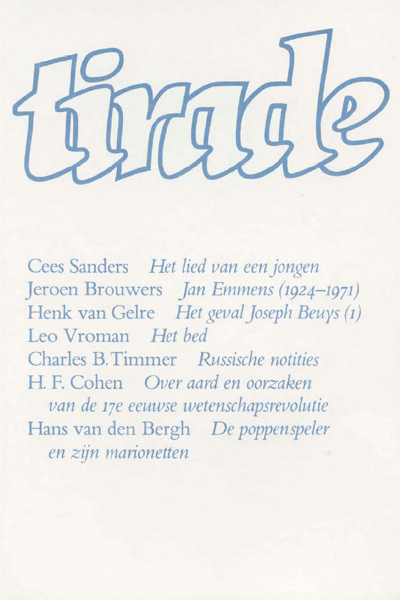H.F. Cohen
Over aard en oorzaken van de 17e eeuwse wetenschapsrevolutie
Eerste ontwerp voor een historiografisch onderzoek*
Dit is het tijdperk waarin – dunkt mij – de natuurwetenschap op komt zetten in een springvloed: en de Aristotelici kunnen net zo goed hopen de stroom van het getij te keren, of (met Xerxes) de oceaan te ketenen, als het overstromen van het vrije denken te weerstaan. Me dunkt, ik zie hoe alle oude troep moet worden weggegooid, en de rotte bouwwerken omvergehaald en weggespoeld in die machtige stortvloed. Dit zijn de dagen die een nieuw fundament moeten leggen voor een luisterrijker natuurwetenschap, één die nooit meer zal worden omvergeworpen; die empirisch en zintuigelijk de verschijnselen van de natuur zal navorsen, de oorzaken der dingen afleidend uit de oorspronkelijke gegevens die wij in de natuur kunnen waarnemen door het experiment en de onfeilbare bewijzen der mechanica: en voorzeker, dit is de manier, en geen andere, om een waarlijk blijvende natuurwetenschap op te bouwen.1.
In deze, en geen andere woorden vatte Henry Power, een op zichzelf niet bijzonder belangrijk microscopist uit de tweede helft van de 17e eeuw, een aantal wezenskenmerken samen van wat hij toen al, in 1664, als een beslissende wending in het denken van de mens over de natuur uitbazuinde, een wending die tegenwoordig algemeen bekend staat als de wetenschapsrevolutie van de 17e eeuw. Powers overtuiging dat in zijn tijd een ingrijpende transformatie gaande was in de visie van de mens op de natuur, is later in
de geschiedschrijving van de natuurwetenschap ten volle bevestigd. Over de vraag of die transformatie er in de eerste plaats een was van methoden dan wel van resultaten; of zij geacht moet worden al te zijn begonnen in de late Middeleeuwen, in de Renaissance, dan wel in het begin van de 17e eeuw; of al dan niet haar dramatisch hoogtepunt Galilei’s fameuze experiment is geweest met die grote en die kleine kanonskogel op de Scheve Toren van Pisa; en of dat beroemde experiment wel ooit werkelijk is uitgevoerd: over deze en dergelijke kwesties zijn in de loop der tijd door wetenschapshistorici de meest uiteenlopende opvattingen naar voren gebracht. Maar nagenoeg geen historicus heeft ooit tegengesproken dàt een dergelijke ingrijpende wending heeft plaatsgevonden, en zelfs diegenen die het sterkst vasthouden aan het idee dat de hele geschiedenis van de natuurwetenschap, van de Egyptenaren tot het heden, ‘van Babel tot Bohr’,2. bovenal door continuïteit en geleidelijkheid wordt gekenmerkt, erkennen toch dat er een specifieke periode is geweest (geëindigd met de voornaamste geschriften van Isaac Newton) waarin de grondkenmerken van de natuurwetenschap sneller en fundamenteler zijn veranderd dan ooit tevoren of nadien. Daarmee is niet gezegd dat de hedendaagse wetenschapsbeoefenaar, bladerend in bijvoorbeeld Newtons Principia, daarin veel zal aantreffen dat hij nu nog voor geldig kan houden of dat zelfs maar op het eerste gezicht begrijpelijk voor hem is. Maar verdiept hij zich er iets meer in, en neemt hij daarna een geschrift van willekeurig welke typisch scholastische, of juist op de magie georiënteerde natuurfilosoof ter hand, dan zal hij, in methode èn resultaten, Newtons werk als onvergelijkelijk meer verwant ervaren dan dat van de man van maar twee of drie generaties eerder. Newtons mechanica heeft niet meer de onbeperkte geldingskracht die er tot het eind van de vorige eeuw aan werd toegeschreven; maar noch de relativiteitstheorie noch de quantummechanica hebben haar zo fundamenteel omvergeworpen als in de 17e eeuw is gebeurd met de Aristotelische en Renaissance natuurfilosofieën.3.
Op één bijzonder kenmerk van die wetenschapsrevolutie wil ik nu meteen met enige nadruk wijzen. Vóór zij plaatsvond, was het uiteindelijk doel van de natuurwetenschap altijd geweest het begrijpen van de natuur, het verklaren van de natuur, het interpreteren van de natuur. In de loop van
de wetenschapsrevolutie kwam daar als doelstelling bij het overwinnen van de natuur, het doelbewust ingrijpen in de natuur, het beheersen van de natuur door de mens. In de loop van de laatste twee of drie eeuwen is het wel heel duidelijk geworden dat dit ideaal niet bij een droom is gebleven, en dat inderdaad de toegepaste wetenschap, in meer of minder nauw samengaan met de techniek, onze wereld heeft veranderd op een wijze en op een schaal waarvoor in de wereldgeschiedenis geen precedent is te vinden. Even lange als vervelende lijsten kunnen worden opgesteld om deze zo triviaal geworden constatering te illustreren; om toch zeker te weten waar we het over hebben zal ik een drietal voorbeelden geven. Ten eerste: als de geneeskunde niet had kunnen profiteren van al die wetenschappelijke inzichten die sedert de wetenschapsrevolutie zijn verworven, zou u, luisteraars, een goede kans maken al lang dood te zijn, of, nog veel waarschijnlijker, nooit te zijn geboren. Ten tweede: stel dat er geen wetenschapsrevolutie had plaatsgevonden. Zou het dan ooit tot de verwestering van de wereld zijn gekomen die onze tijd zozeer kenmerkt, en die niet minder voelbaar is waar ze wordt afgeweerd dan waar ze geestdriftig wordt binnengehaald? Is het niet veel aannemelijker dat de politiek, cultureel en economisch zo overheersende positie die het Westen over het Oosten verwierf in de periode van de ontdekkingsreizen en het vroege imperialisme, binnen een eeuw of wat weer ongedaan zou zijn gemaakt, als zoveelste manifestatie van de onophoudelijke golfbeweging die de wereldgeschiedenis tot dan toe had gekenmerkt? En ten derde: elektrisch licht, computers, kernwapens, televisies, auto’s, effectieve anticonceptiva, vliegtuigen, koelkasten, kopieermachines…
Nu zijn dit heel wat stelliger beweringen dan menig historicus voor zijn rekening zou willen, of ooit zou hebben willen nemen. In mijn onderzoek naar de geschiedenis van de meningsvorming over aard en oorzaken van de wetenschapsrevolutie, onderzoek waar deze oratie niet meer dan de aankondiging van vormt, zal het zeker tot mijn eerste taken behoren na te gaan wanneer historici zoal niet met het precieze concept, dan toch met het idee van de wetenschapsrevolutie zijn begonnen te werken, en hoe zij de betekenis van die revolutie voor de mensheid hebben getaxeerd.4. Maar toch is deze kwestie op dit moment niet mijn hoofdprobleem. Het gaat me er
nu alleen om, vast te stellen dàt de wetenschapsrevolutie een gebeurtenis is geweest van unieke betekenis voor de mensheid, en dat vrijwel iedereen die zich ooit met de geschiedenis ervan heeft beziggehouden zich daar, hoe vaag misschien ook, van bewust is geweest. En zo is het een heel natuurlijke zaak dat bestudering van de wetenschapsrevolutie heeft geleid tot de vraag wat de oorzaak of oorzaken van die unieke gebeurtenis wel mogen zijn geweest. Het zojuist aangeduide behoeft, lijkt mij, geen verder betoog om aannemelijk te maken dat we hier met een kernprobleem van de geschiedenis te maken hebben, van niet minder belang dan de vraag naar de oorzaken van andere Sternstunden der Menschheit als de oorsprong van de zogeheten agrarische of neolithische revolutie, of de opkomst van het monotheisme, of de eenwording van China onder de Ch’in, of de volksverhuizingen, of het uitbreken van de Eerste Wereldoorlog en de daardoor mogelijk geworden bolsjewistische staatsgreep van november 1917.
Op die vraag naar de oorzaken van de wetenschapsrevolutie, de vraag dus hoe zij heeft kunnen plaatsvinden en welke omstandigheden haar mogelijk hebben gemaakt, zijn in de loop van meer dan een eeuw de meest uiteenlopende antwoorden gegeven. Ik noem u er een aantal: het plaatsvinden van de wetenschapsrevolutie is toegeschreven aan de ontdekkingsreizen; aan de behoeften opgeroepen door de eerste, pre-industriële kapitaals-accumulatie; aan de voorafgegane uitvinding van uurwerk, drukpers en dieptemijnbouw; aan de gelukkige toevalstreffer van het optreden van Copernicus, Kepler en Galilei precies op het moment dat de tijd voor hun ideeën rijp was; aan de Puriteinse ethiek; aan de invloed die meer in het algemeen van de Reformatie is uitgegaan; aan het noncyclisch karakter van het Christelijk tijdsbegrip.5. Zo op zichzelf zeggen deze voorbeelden u allicht weinig tot niets; waar het in elk afzonderlijk geval om gaat is de soms uiterst ingenieus geconstrueerde, door diep uit de geschiedenis opgegraven gegevens aaneengeschakelde keten van causale mechanismen waardoor de voor de wetenschapsrevolutie uiteindelijk verantwoordelijk gestelde historische factor daadwerkelijk als verklaring geacht wordt te functioneren. Ik kan dat in dit korte bestek natuurlijk niet voor alle aangehaalde voorbeelden illustreren, die trouwens op zichzelf nog maar een gering deel uitmaken van wat er in de loop der tijd aan verklaringen zoal
naar voren is gebracht. Om toch een idee te geven van hoe zo’n historische redenering verlopen kan, werk ik hier één voorbeeld wat nader uit, en wel het verklaringsmodel waarin geprobeerd wordt een verband te leggen tussen de wetenschapsrevolutie en de geschiedenis van de middeleeuwse en Renaissance techniek.
Lange tijd is de wetenschapsrevolutie vooral opgevat als een omwenteling in het denken, die het best vanuit ideeënhistorische of zelfs aan de geschiedenis van de filosofie ontleende concepties kon worden benaderd. Galilei’s valwetten getuigen in deze visie vooral van een nieuwe manier van denken over de natuur, waarin voor het eerst expliciet de vraag naar het ‘hoe’ veeleer dan het ‘waarom’ van de valbeweging wordt gesteld, waarin voor het eerst de val als ideaal verschijnsel wordt behandeld, onder wegdenken van de luchtweerstand, en waarin voor het eerst aan het resultaat een exacte, gemathematiseerde vorm wordt gegeven. Nu is – zonder dat de geldigheid van deze beschouwingswijze ook maar enigszins in twijfel werd getrokken – een zestig jaar geleden de aandacht gevestigd op het zo opvallende verschijnsel dat vele van de pioniers van de nieuwe natuurwetenschap stellig grote denkers zijn geweest, maar tevens op diverse wijze zich met de techniek hebben ingelaten.6. Vóór 1610 was Galilei in zijn openbare optreden niet veel anders dan een ingenieur in de traditie van typische Italiaanse Renaissance-ingenieurs als Alberti of Leonardo da Vinci. Ook heeft Galilei er zelf met enige nadruk op gewezen hoe hij tot zijn ideeën over het (door de toen heersende natuurwetenschap voor onmogelijk gehouden) vacuum is gekomen – ideeën die via Torricelli door Pascal tot een complete theorie van de werking van de luchtdruk zouden worden uitgewerkt. In zijn hoofdwerk, de in 1638 gepubliceerde Discorsi, schrijft Galilei nl. dat wat hem over het vacuum aan het denken heeft gezet, de ontmoeting is geweest met een werktuigkundige die hem attent maakte op het in diens kring welbekende maar nooit tot onderwerp van theorievorming gemaakte ervaringsverschijnsel dat water niet hoger dan ca. 10 meter omhoog kan worden gepompt omdat anders de waterkolom ‘breekt’. En eenmaal op dergelijke verbindingen tussen de vroeg-17e eeuwse natuurwetenschap en de techniek opmerkzaam gemaakt, kan men er tientallen opsporen. Ik noem er een paar, sommige al lang algemeen bekend, andere
pas onlangs ontdekt. Pascals experimentele vaststelling van het hoogteverschil in een afgesloten glazen buis tussen een in een vloeistofbak geplaatste kolom water en een kolom Franse landwijn had veel te danken aan de hoge stand van de glasblaastechniek in de plaats waar hij leefde, Rouen. Kepler werd mede door Albrecht Dürers beschrijving van de camera obscura geïnspireerd tot zijn theorieën over de beeldvorming in het oog. Isaac Beeckman had zijn verklaring van de muzikale dissonantie uit zwevingen niet kunnen geven als hij niet op het zwevingsverschijnsel attent was gemaakt door een bevriende organist (klavierspelers en -bouwers benutten toen als nu zwevingen bij het stemmen van hun instrumenten).7. Christiaan Huygens’ in eigen ogen grootste wetenschappelijke ontdekking – het tautochronisme van de cycloïde – vloeide rechtstreeks voort uit problemen die hij tegenkwam bij zijn poging het door hem uitgevonden slingeruurwerk nog nauwkeuriger te maken, op grond van motieven die evenzeer met theoretische drang naar perfectie als met de praktische behoefte van burgers, astronomen en zeelieden aan een exacte tijdmeting te maken hadden. En er kunnen ook meer algemene voorbeelden worden gegeven. Zo waren sommige hoofdfiguren van de wetenschapsrevolutie – Stevin is de bekendste – zelf in de eerste plaats ingenieur, al is het ook weer niet zo dat Stevins meest bekend gebleven prestatie – de fameuze zeilwagen – nu ook zijn belangrijkste of zelfs maar origineelste bijdrage aan het technisch kunnen van zijn tijd zou zijn geweest. Het verband tussen de beoefening van de sterrenkunde en het probleem van het vinden van een methode voor de bepaling van de geografische lengte op zee is voor de wetenschapshistoricus een vanzelfsprekendheid; een relatie tussen de door Galilei opgeloste vraag naar de vorm van de kogelbaan en de opkomst van de artillerie wordt door maar weinigen betwist.
Het ligt voor de hand – en daarmee keer ik terug naar waar het me op dit punt in mijn betoog, de verklaring van de wetenschapsrevolutie, om begonnen is – dat de historici van natuurwetenschap en techniek het niet bij het constateren van deze klaarblijkelijke techniekafhankelijkheid van de 17e eeuwse natuurwetenschap hebben gelaten, maar dat ze hebben geprobeerd het ei van de wetenschapsrevolutie van een degelijke technische kip te voorzien. Het daarbij onderstelde legproces komen we in diverse vari-
anten tegen. Min of meer pure techniekhistorici als White en Cardwell laten het bij de tamelijk globale constatering dat de belangrijkste middeleeuwse technische vindingen – met name de mechanische klok – en processen (in het bijzonder de mijnbouw) een aantal vraagstellingen en gewoonten hebben opgeleverd zonder welke de wetenschapsrevolutie, waarin kwesties van tijd en het vacuum zo’n constituerende functie vervulden, niet goed denkbaar zou zijn geweest. Maar juist omdat een instrument als de in de 13e/14e eeuw uitgevonden mechanische klok werkte krachtens beginselen waar de Aristotelische natuurwetenschap van die en volgende eeuwen totaal geen weg mee wist, moet er tussen de 14e en de 17e eeuw iets anders zijn gebeurd dat tot de breuk met het Aristotelisme de directe aanleiding heeft gevormd. Dat ‘iets’ is in de jaren ’40 door de socioloog Zilsel gezocht in een specifiek sociaal proces, nl. het voor het eerst met elkaar in rechtstreeks contact komen van drie onderscheiden sociale groepen, de scholastici aan de universiteiten, de humanisten aan de hoven, en de handwerkers/ingenieurs in hun werkplaatsen. Kort in Zilsels eigen woorden samengevat:
… De beide componenten van de wetenschappelijke methode waren door een sociale barrière gescheiden: logische scholing was aan de geleerden uit de hogere klasse voorbehouden; experimenteren, verklaringsbehoefte en kwantitatieve methoden waren aan de meer of minder plebejische handwerkers overgelaten. De wetenschap werd geboren, toen met de vooruitgang van de techniek de experimentele methode tenslotte de sociale vooroordelen tegen het handwerk overwon en door rationeel geschoolde geleerden werd overgenomen.8.
Wat de waarde, zowel naar heuristische vruchtbaarheid als naar empirische houdbaarheid van deze en dergelijke pogingen tot verklaring van de wetenschapsrevolutie ook zijn mag – ik kom zometeen daar nog nader over te spreken -, gemeen hebben alle tot nu toe door mij aangehaalde factoren dat ze deel uitmaken van de geschiedenis van West-Europa zelf. Dat ligt voor de hand: een uniek Westers gebeuren als de wetenschapsrevolutie kan, indien al, alleen verklaard worden uit omstandigheden en processen die zich in haar onmiddellijke tijdelijke en plaatselijke nabijheid hebben afgespeeld. Maar dat neemt niet weg dat de vraag welke specifiek-Wes-
terse factor – de ontdekkingsreizen, de Reformatie, de opkomst van het kapitalisme, de middeleeuwse en Renaissance techniek – dan als uiteindelijke oorzaak moet worden aangewezen wel degelijk kan worden verhelderd door de vraag te stellen hoe het komt dat sommige andere hoogontwikkelde beschavingen – de Byzantijnse, de Arabische, de Indische, de Chinese, de Japanse – de moderne natuurwetenschap niet zelf hebben ontdekt maar pas veel later door import uit het Westen hebben leren kennen. China had toch ook, al vóór 1600, getuige bijvoorbeeld buskruit en kompas, een hoge stand van technisch kunnen bereikt; het bevoer toch ook de zeeën, bezat toch ook een grote kapitalen vergarende klasse van kooplieden, beschikte toch ook over een intellectuele elite met voldoende vrije tijd en capaciteit tot abstract redeneren, en over fijn gedifferentieerde filosofische concepties als het Confucianisme en het Taoïsme? Het is duidelijk dat een vergelijkende studie, waarin de precieze verschillen tussen deze historische entiteiten en hun Westerse pendanten nauwkeurig en gedetailleerd worden onderzocht, zoals voor China al tientallen jaren door Joseph Needham wordt gedaan, hier uitkomst kan brengen. Vanuit een dergelijke comparatieve aanpak kan licht worden geworpen, zowel op de vraag hoe het komt dat in China, of een ander Oosters cultuurgebied, de wetenschapsrevolutie niet heeft plaatsgevonden, als, keerzijde van dezelfde medaille, wat dan in de Westeuropese geschiedenis heeft gemaakt dat zij hier wel plaatsvond.
Langs beide hier aangeduide lijnen, de rechtstreekse Westerse zogoed als de comparatieve Oosterse, is een verrassend groot aantal pogingen ondernomen tot verklaring van het ontstaan van de wetenschapsrevolutie. Er is geen sprake van dat over dit zo centrale historische vraagstuk ook maar bij benadering iets als consensus zou zijn bereikt. Integendeel, elke nieuwe poging geeft het aanzijn aan weer nieuwe controversen, waarvan geen enkele ooit voorgoed lijkt te worden opgelost, al was het maar door algemene overeenstemming dat althans deze of gene specifieke verklaring voortaan definitief als onhoudbaar kan worden beschouwd. Nu ben ik ervan overtuigd dat zeker één van de redenen waarom dit historisch debat zo volstrekt onbeslist alsmaar voortgaat, is dat het eigenlijk niet zozeer een debat is alswel een reeks separate monologen, gevolg van het feit dat wei-
nig of geen historici zich van het bestaan ervan in zijn volle omvang bewust zijn.9. En dit komt op zijn beurt doordat de discussie over de oorzaken van de wetenschapsrevolutie, die nu al meer dan een eeuw woedt, nimmer is vastgelegd, laat staan kritisch geanalyseerd. Daarom lijkt het mij een urgente taak, urgenter in feite dan weer een nieuwe, en dan hopelijk definitieve verklaring aan de reeks toe te voegen, nu eerst eens bijeen te brengen wat er tot op heden aan verklaringen geleverd is, en de opbrengst kritisch te bekijken en uit te wieden. Dit is het onderzoek dat ik mij voorstel in de komende jaren te gaan uitvoeren. Het is een historiografisch onderzoek, wat wil zeggen dat het niet in eerste instantie gaat om de feiten van het verleden van de wetenschap in de betrokken periode zelf, maar om wat de historici daar de afgelopen anderhalve eeuw over te berde hebben gebracht. Deze oratie is niet meer dan een aankondiging van dit mijn onderzoeksprojekt, al twijfel ik er nauwelijks aan dat het uiteindelijk resulterende boek er toch weer heel anders uit zal blijken te zien dan ik mij dat nu, nog maar kort geleden met het onderzoek in kwestie begonnen, voorstel. Voor de liefhebber van het hedendaags onderzoeksbeleid voeg ik er nog aan toe dat het hier een eenmansprojekt betreft – al zal ik er natuurlijk met geïnteresseerde terzake kundigen in binnen- en buitenland over aan de praat zien te raken -, dat het niet zozeer veel geld als vooral tijd kost, dat ik het overgrote deel van de tijd die mijn overige universitaire kerntaken mij laten eraan hoop te kunnen besteden, dat ik wel in staat maar geenszins bereid ben door middel van enige verbale kunstgrepen het projekt in een of ander ten departemente af te stempelen 5-manjaarssuperprogramma ‘in te brengen’, en dat de enige vorm van ‘externe beoordeling’ die mij passend en terzake lijkt die is van het eindresultaat, te publiceren in de Engelse taal, in algemeen toegankelijke en voor publieke kritiek door vakgenoten vatbare vorm.10.
Terug nu naar een nadere uiteenzetting van hoe ik mij voorstel het onderzoek op te zetten. Er kan namelijk niet worden volstaan met een historiografisch onderzoek naar de oorzaken van de wetenschapsrevolutie, immers, die kwestie is onlosmakelijk verbonden met een historiografisch onderzoek naar de aard ervan. Er zijn verscheidene redenen waarom dat zo is.
In de eerste en belangrijkste plaats is het eenvoudig een historisch feit dat
de ideeën van menig wetenschapshistoricus over de oorsprongen van de wetenschapsrevolutie zijn ontwikkeld in de context van hun ideeën over de vraag wat die wetenschapsrevolutie dan wel inhield. Zo was Pierre Duhem – vooraanstaand fysicus, wetenschapsfilosoof en wetenschapshistoricus rond de eeuwwisseling, tevens ultra-orthodox rooms-katholiek en fervent nationalist – ervan overtuigd dat het bezit van de Franse nationaliteit en van het rk geloof een bijzonder gunstige invloed uitoefent op het peil van iemands wetenschapsbeoefening, en dat dus ook de grote wetenschappelijke transformatie aan het eind waarvan Newton staat, haar oorsprong in dergelijke wortels hebben moest. Waar het in zijn tijd gangbare geschiedbeeld van duistere Middeleeuwen gevolgd door het plotselinge licht van Copernicus, Kepler en Galilei hem aan de vereiste katholieke Fransen niet of nauwelijks helpen kon – ik ontdoe Duhems aanpak nu maar even van alle er wel degelijk in aangebrachte nuances -, besloot hij in de tijd terug te gaan, en kwam hij via onderzoek naar de bronnen van de natuurwetenschappelijke notities van Leonardo da Vinci uit op de volledig vergeten geraakte 14e eeuwse school van de zogeheten ‘Parijse Terministen’. Dit was een groep docenten aan de Universiteit van Parijs, die zich verrassend vrij ten opzichte van Aristoteles (een eeuw tevoren door Dante nog ‘de meester van allen die weten’ genoemd) hadden opgesteld, en in wier geschriften Duhem menige stelling en menige methode meende terug te vinden waarvan tot dan toe Galilei en zijn tijdgenoten als de ontdekkers waren aangezien. Voorbeelden zijn de manier waarop Jean Buridan een traagheidsbeginsel lijkt in te voeren, of Nicole Oresme de dagelijkse draaiing van de Aarde om haar as lijkt te verdedigen, of de eerste beginselen van de analytische meetkunde lijkt op te stellen. Aldus kwam Duhem er in 1913 toe, in zijn buitengewoon invloedrijke boek Les Précurseurs Parisiens de Galilée de stelling te verdedigen dat de wetenschapsrevolutie in werkelijkheid in de 14e eeuw, met de Terministische school van Buridan en Oresme was begonnen.11. Klaarblijkelijk is het niet mogelijk, recht te doen aan Duhems opvattingen over het waarom van de wetenschapsrevolutie, zonder eerst een blik te werpen op zijn ideeën over wanneer, waar en hoe die begonnen is. En dit geldt meer algemeen: alle historici die over de oorzaken van de wetenschapsrevolutie hebben geschreven,
hadden althans enige notie omtrent de historische plaats, tijd en aard ervan, onverschillig of zo’n notie voortvloeide uit eigen onafhankelijk onderzoek dan wel onkritisch, of zelfs onbewust, van al bestaande historische concepties werd overgenomen.
Nauw verband hiermee houdt de omstandigheid dat zonder enig voorafgaand idee over de vraag wanneer, waar en hoe nu precies de wetenschapsrevolutie heeft plaatsgevonden, het eigenlijk niet mogelijk is ideeën over de oorzaken ervan kritisch te bekijken. Om bij het gekozen voorbeeld te blijven: een kritisch oordeel over Duhems basisstelling omtrent de wetenschappelijke vruchtbaarheid van het Franse katholicisme is er uiteraard volledig van afhankelijk of men het met Duhem eens is dat de wetenschapsrevolutie inderdaad in de 14e eeuw is begonnen, of dat, onder erkenning van de betekenis van het optreden van Buridan en Oresme en trouwens van hele stoeten nadien ontdekte meer of minder kritische Aristotelianen, toch Galilei en Kepler en sommige van hun tijdgenoten als de ware pioniers moeten worden beschouwd. Overigens is de Duhem-these uitermate vruchtbaar geweest voor het wetenschapshistorisch onderzoek: het vroegere al te grove beeld van obscurantistische Middeleeuwen gevolgd door het stralend licht van de grote rationalisten Kepler en Galilei wordt door geen historicus meer aanvaard, en, al zal men ook geen aanhangers van de Duhem-these in haar pure vorm meer aantreffen, dat neemt toch niet weg dat van vijf erkende, in de laatste veertig jaar tot stand gekomen geschiedenissen van de wetenschapsrevolutie maar liefst drie haar vóór Copernicus laten beginnen (resp. in 1300, in 1450 en in 1500), en slechts één zijn start in 1600 kiest.12.
Laat ik nog een heel ander voorbeeld geven van de manier waarop het kritisch oordeel over een poging tot verklaring van de wetenschapsrevolutie noodzakelijk afhangt van historisch onderzoek naar de aard ervan. In Capitalism, socialism and democracy, een boek uit 1942 dat vaker wordt aangehaald naarmate de economische conjunctuur ernstiger baisse-verschijnselen vertoont, komt een korte passage voor waarin Schumpeter een verband construeert tussen de opkomst van het vroege kapitalisme en de door hem in de 15e t/m 17e eeuw gesitueerde opkomst van de moderne natuurwetenschap. Hij betoogt daar drie dingen. Ten eerste zegt hij dat, in het
algemeen, economisch handelen door het dwingend verband tussen doel en middelen een rationele geesteshouding bevordert. Ten tweede zou die rationaliteit worden versterkt en toegespitst door een kapitalistische orde waarin, met het geld als eenheid, kosten-baten analyses zo’n onmisbaar element vormen, neergelegd in het nieuwe middel van de dubbele boekhouding. En tenslotte zou dan die aldus geïntensiveerde rationaliteit zich uitbreiden tot ver buiten de economische sector, en uiteindelijk ‘s mensen filosofie, geneeskunst, ideeën van rechtvaardigheid en schoonheid, en ook zijn natuurwetenschappelijk wereldbeeld aan zich onderwerpen. Om kort te gaan:
Het harde individualisme van Galilei was het individualisme van de opkomende kapitalistische klasse… de geest achter dergelijke [wetenschappelijke] heldendaden [was] de geest van een rationalistisch individualisme, de geest gewekt door het kapitalisme in opkomst.13.
Eén van de moeilijkheden met de hier geschetste constructie – die naar mijn indruk teruggaat op de Duitse sociologie rond de eeuwwisseling, Weber en Simmel in het bijzonder – is dat ze er volstrekt ten onrechte van uitgaat dat het de natuurwetenschap van vóór de revolutie aan rationaliteit mankeerde. Maar in feite waren zowel de Euclidische meetkunde als de Aristotelische natuurfilosofie – beide uiteraard van vóórkapitalistische oorsprong – monumenten van rationaliteit, vertoonde met name de tweede eerder een overmaat daaraan inzoverre Aristoteles juist de gewoonte had op een paar elementaire waarnemingen in de dagelijkse werkelijkheid een uitvoerig rationeel systeem te bouwen zonder zich om empirische, laat staan experimentele toetsing dan nog veel te bekommeren. Het nieuwe dat de wetenschapsrevolutie bracht, was niet een rationeler fysica, of al direct een sterk verbeterde wiskunde, maar veeleer het inzicht dat hele takken van de natuurwetenschap als bijv. de bewegingsleer, zelf voor wiskundige, strikt kwantitatieve behandeling in aanmerking komen. En het is niet zo één twee drie in te zien hoe die mathematisering van de natuurwetenschap in de handen van geleerden als Galilei, Kepler, Pascal, Huygens en Newton, in de minstens twee eeuwen aan hun optreden voorafgegane opkomst van het kapitalisme haar oorsprong kan vinden.14. Ook pogingen, van Marxistische zijde wel ondernomen, waarin niet de
opkomst van de moderne natuurwetenschap twee eeuwen naar voren, maar de opkomst van het vroege kapitalisme twee eeuwen naar achter wordt geschoven, lopen mijns inziens op dergelijke tegenwerpingen vast.15. Daarmee is niet gezegd dat pogingen om te betogen dat één en dezelfde, relatief gefragmenteerde, in tal van afzonderlijke en betrekkelijk autonome machtscentra opgesplitste middeleeuwse samenleving de condities schiep waaronder èn het vroege kapitalisme èn de moderne natuurwetenschap eerst mogelijk werden, bij voorbaat tot mislukken gedoemd zouden zijn. Integendeel, ik denk dat dergelijke beschouwingen van het grootste nut zouden kunnen zijn bij het beantwoorden van de vraag waarom de wetenschapsrevolutie nu juist in West-Europa plaats heeft gevonden; maar tot een antwoord op de vraag waarom dat dan in de 17e eeuw is gebeurd kunnen ze uit de aard der zaak niet bijdragen.
Het voorafgaande samenvattend, kunnen we concluderen dat een onderzoek naar het waarom van de wetenschapsrevolutie niet alleen historisch, maar ook logisch wordt voorafgegaan door een verkenning van het wanneer, waar en hoe ervan. Aldus valt het historiografisch onderzoek dat ik mij voorstel te ondernemen in twee hoofddelen uiteen. Het eerste zal moeten bestaan uit een chronologisch overzicht van de visies die historici hebben ontwikkeld op de aard van de wetenschapsrevolutie. Daarbij zal ik mij niet beperken tot inhoudelijke elementen als de zojuist aangehaalde mathematisering van de 17e eeuwse natuurwetenschap, of haar experimentele karakter, of de in de 17e eeuw gangbaar geworden verklaring der natuurverschijnselen uit de onderlinge plaatsveranderingen van submicroscopisch kleine materiedeeltjes van verschillende vorm en grootte. Evenzeer terzake doen hierbij even wezenlijke kenmerken van de wetenschapsrevolutie die meer sociaal dan cognitief van aard zijn, zoals de profetie van Francis Bacon over het toekomstig maatschappelijk nut van de praktische toepassing van een vernieuwde natuurwetenschap, of, ander voorbeeld, de nieuwe sociale rol die, in een snel proces van professionalisering, door de wetenschapsman werd vervuld, of de opkomst van een nieuw stel waarden en normen die het gedrag van de beoefenaren van de nieuwe natuurwetenschap onderling reguleerden, of het ontstaan, in de tweede helft van de 17e eeuw, van georganiseerde wetenschappelijke
gemeenschappen en vaktijdschriften.
Deel ii zal dan een zo compleet mogelijk overzicht moeten bevatten, uit uiteenlopende taalgebieden bijeengesprokkeld, van historische theorieën ter verklaring van de wetenschapsrevolutie. Hier lijkt een systematische indeling het doelmatigst, waarbij het onderscheid tussen meer op het sociale en meer op het cognitieve gerichte verklaringen het voornaamste ordeningsbeginsel zal uitmaken, en ook het onderscheid tussen de directe ‘Westerse’ en de comparatieve ‘Oosterse’ aanpak passend zal worden benut. Bij dit alles wordt de term ‘historici’ heel ruim gebruikt, en in feite op eenieder toegepast die ooit een historische verklaring van de wetenschapsrevolutie heeft trachten te geven, onverschillig of hij of zij van huis uit wetenschapshistoricus, ‘gewoon’ historicus, fysicus, socioloog, filosoof, of wat dan ook is.
Tot nu toe ben ik er stilzwijgend van uitgegaan dat de wetenschapsrevolutie een verschijnsel is geweest dat überhaupt voor verklaring in aanmerking komt. Ik besef maar al te goed dat dat op zichzelf een dubieuze vooronderstelling is, waarvan men zich bovendien niet af kan maken door te zeggen, hetzij dat een uniek historisch gebeuren strikt genomen nooit kan worden ‘verklaard’, hetzij dat een zo complex historisch gebeuren een minstens even complex stel oorzaken moet hebben gehad, die gezamenlijk worden uitgemaakt door al wat aan de te verklaren historische gebeurtenis is voorafgegaan. De noodzaak, kortom, van een kleine uitweiding op het zo omstreden terrein van de aard van de historische verklaring zal in het te schrijven boek koelbloedig onder ogen moeten worden gezien. Zoveel lijkt in elk geval zeker dat het a priori wel uiterst onwaarschijnlijk is dat alle ooit ter verklaring aangeboden historische feiten, gebeurtenissen, processen en standen van zaken toevallig zouden zijn samengevallen teneinde omstreeks 1600 die plotselinge uitbarsting van wetenschappelijke creativiteit mogelijk te maken. Bij dit alles moeten we ons één ding steeds goed voor ogen houden, waar Einstein al de nadruk op heeft gelegd: het te verklarene is niet dat de moderne wetenschappelijke methode elders en eerder niet is ontdekt, wonderlijk is veeleer dàt ze ooit is ontdekt.16.
Het aldus in ruwe, uit de aard der zaak zeer voorlopige lijnen geschetste onderzoeksontwerp biedt, naast de inherente aantrekkelijkheid die het
althans voor mij heeft, nog een aantal andere voordelen. Een praktisch voordeel is dat het zich zonder veel moeite laat opsplitsen in een groot aantal deel-onderzoekingen waaraan doctoraalstudenten bij wijze van afstudeeropdracht misschien een bijdrage zouden kunnen leveren. Een ander voordeel is dat in dit onderzoek de zogeheten interne en externe benaderingen van de wetenschapsgeschiedenis op ongedwongen wijze samengaan. De intern gerichte wetenschapsgeschiedschrijving houdt zich bezig met de opeenvolging in de tijd van nieuwe wetenschappelijke ideeën, problemen en oplossingen, de externe met alles daarbuiten voorzover voor de ideeënontwikkeling terzake geacht, zoals het filosofisch en religieus denkklimaat, de sociale verhoudingen van het tijdperk in kwestie, enzovoorts. In het al lang lopend en zo langzamerhand steriel geworden debat tussen aanhangers van beide benaderingen hebben de internalisten mijns inziens het gelijk aan hun kant inzoverre de geschiedenis van de opeenvolging van wetenschappelijke ideeën onherroepelijk de harde kern van het vak wetenschapsgeschiedenis uitmaakt, zogoed als de opeenvolging en overdracht van technische vindingen de kern is van de techniekgeschiedenis. De externe benadering kan pas dan werkelijk vruchtbaar worden – mijn aan Schumpeter ontleende voorbeeld illustreert het a contrario – wanneer ze de resultaten van het interne onderzoek grondig tot zich door heeft laten dringen. Maar veel internalisten stellen zich ook tegenover een dergelijke externe aanpak nog altijd vaak nodeloos schichtig op, vanuit de dubbele verdenking dat die externe benadering in feite alleen op een sociale, en die sociale in feite op een Marxistische neerkomt. Maar dat behoeft, zo hoop ik te hebben laten zien, geenszins noodzakelijk het geval te zijn. De gedachte dat nieuwe wetenschappelijke ideeën, of technische vondsten, tot stand zouden komen in compleet isolement van de omringende wereld en haar invloeden, en een soort pure actus intellectus zijn zou, komt mij onbegrijpelijk naïef voor. De wetenschapshistoricus die zich zo opstelt, verergert alleen maar het specialistisch isolement waarin de wetenschapshistorie zich toch al veel te sterk bevindt (ook al is dat bepaald niet alleen haar eigen schuld), en verliest de mogelijkheid tot integratie in het geheel van de geschiedenis, of althans van het beeld dat wij daarvan trachten te vormen. Het is de behoefte aan een dergelijke integratie bovenal, die een stempel
zal drukken op mijn bezigheden aan deze th. De onderafdeling der Wijsbegeerte en Maatschappijwetenschappen heeft, door te opteren voor een uit de sociale geschiedenis voortgekomen wetenschapshistoricus, heel goed geweten dat ze daarmee een enigszins veranderde, en vooral uitgebreide voortzetting gaf aan de door mijn voorganger Noud van Schelven met zoveel zorg en toewijding gelegde techniekhistorische grondslagen. De zin waarin ik mijn vakgebied wil verstaan is die van een ‘sociale geschiedenis van natuurwetenschap en techniek’, een begrip dat ik niet verder meer behoef uit te werken omdat ik het, duidelijker dan mij in abstracte termen mogelijk is, heb geïllustreerd aan het voorbeeld van het historiografisch onderzoek dat ik in het voorgaande heb geschetst.17. Dat onderzoek zal moeten uitlopen op het opmaken van een soort winst- en verliesrekening: er zal uit naar voren moeten komen welke verklaringen van de wetenschapsrevolutie de moeite van het verder vervolgen waard lijken, en langs welke paden dat wellicht op de vruchtbaarste wijze geschieden kan. Stellig zal daarbij blijken dat vele van die paden voeren door met schrikdraad omgeven grasland waarop gegraasd wordt door de meest diverse ‘gewone’ historici (dit begrip genomen ter collectieve onderscheiding van de historici van wetenschap en techniek). Een aanzienlijk deel van het thans opgezette onderzoek komt aldus neer op een poging om één van de kernproblemen van de geschiedenis van de natuurwetenschap, en dus van de mensheid, zodanig te formuleren dat de voortgezette bestudering ervan de moeite waard zal lijken te zijn, niet alleen van die talrijke wetenschapshistorici die al lange tijd zich de betekenis ervan bewust zijn, maar ook van die nog veel talrijker ‘gewone’ historici – sociale historici, economische historici, beoefenaren van de geschiedenis van de wijsbegeerte, kerkhistorici, enzovoorts – wier belangstellende deelneming onmisbaar is, willen wij ooit te weten komen wat nu precies de oorzaak is geweest van die unieke gebeurtenis in de geschiedenis, genaamd de wetenschapsrevolutie van de 17e eeuw.
Aan het eind van deze voordracht gekomen, wil ik al diegenen dank zeggen die, door het plaatsen van een handtekening of anderszins, aan mijn benoeming hebben meegewerkt. Deze dank strekt zich in het bijzonder uit
tot de leden van de vakgroep Wijsbegeerte en Geschiedenis, wier samenstelling even heterogeen bleek als de naam al had doen vermoeden, en in wier filosofisch opengehouden bijt ik mij bij tijden een vreemde eend voel, meestal echter een wel van afwijkende denkgewoonten voorzien maar als zodanig geheel aanvaard deelnemer. Temidden van de wijsgerige stormen vormt de nauwe samenwerking met mijn medewerkers Paul Lauxtermann en Nancy Nersessian een steeds weer inspirerend rustpunt. Dat rustpunt heb ik trouwens ook nodig als een enkele keer heimwee naar het Museum Boerhaave mij overvalt, een instelling waarvan de medewerkers zeer goed weten dat ik haar niet heb verlaten omdat ik na jaren van opgewekte samenwerking van hun gezelschap genoeg zou hebben gekregen.
Drie historici in het bijzonder hebben mijn manier van met de geschiedenis om te springen richting gegeven. Mijn vader heeft door de vrolijke en stimulerende wijze waarop hij over zijn vak praatte mij van mijn jeugd af aan het besef bijgebracht dat het een zinvolle onderneming is, je met het verleden bezig te houden, zowel om het heden beter te kunnen begrijpen als om zich zelfs wille. Dick van Arkel heeft, zowel door mij in kennis te brengen met het werk van Popper als door zijn eigen voorbeeld, laten zien hoe ongelofelijk vruchtbaar de – van huis uit natuurwetenschappelijke – probleemstellende methode, met alle vereiste modificaties, ook voor het historisch onderzoek zijn kan. En R. Hooykaas heeft, door zijn demonstratie dat de wetenschapsgeschiedenis niet uit een dorre opsomming van positivistisch geselecteerde succesnummers bestaat maar een levend, echt historisch vak is, meer dan wie ook mijn keuze, nu negen jaar geleden, voor de wetenschapsgeschiedenis mogelijk gemaakt, een keuze waar ik nog geen seconde spijt van heb gehad omdat ze me in staat stelt me niet zomaar uit liefhebberij, maar ook nog uit hoofde van mijn vak te verdiepen in het denken van de grootste geesten die de mensheid heeft voortgebracht.
- *
- Rede, uitgesproken bij de aanvaarding van het ambt van gewoon hoogleraar in de Historische aspecten van techniek en maatschappij aan de Technische Hogeschool Twente op 9 juni 1983.
- 1.
- H. Power, Experimental Philosophy (London, 1664; geciteerd uit de facsimileeditie: New York/London, 1966), 192: ?This is the Age wherein (me-thinks) Philosophy comes in with a Spring-tide; and the Peripateticks may as well hope to stop the Current of the Tide, or (with Xerxes) to fetter the Ocean, as hinder the overflowing of free Philosophy: Me-thinks, I see how all the old Rubbish must be thrown away, and the rotten Buildings be overthrown, and carried away with so powerful an Inundation. These are the days that must lay a new Foundation of a more magnificent Philosophy, never to be overthrown: that will Empirically and Sensibly canvass the Phaenomena of Nature, deducing the Causes of things from such Originals in Nature, as we observe are producible by Art, and the infallible demonstration of Mechanicks: and certainly, this is the way, and no other, to build a true and permanent Philosophy.? Ik vond dit citaat als aanhef gebruikt in G. B?hme et al., Experimentelle Philosophie. Urspr?nge autonomer Wissenschaftsentwicklung (Frankfurt aM, 1977), op welk boek ik attent ben gemaakt door Dirk Stemerding.
- 2.
- Zo luidt de ondertitel van R. Hooykaas, Geschiedenis der natuurwetenschappen (Utrecht, 1971).
- 3.
- E.J. Dijksterhuis, De mechanisering van het wereldbeeld (Amsterdam, 1950), Deel v, ?9.
- 4.
- Volgens Harcourt Brown, in V.L. Bullough (ed.), The Scientific Revolution (Huntington, NY, 1970), p. 58, is de term voor het eerst gebruikt door Alexandre Koyr? in 1943. Zie over het revolutie-idee in de natuurwetenschap in het algemeen I.B. Cohen, The eighteenth-century origins of the concept of scientific revolution, in: Journal of the History of Ideas 37, 1976, 257-288.
- 5.
- Uitvoerige referenties opnemen heeft in deze beginfase van het onderzoek weinig zin; dat komt later, in de definitieve publicatie.
- 6.
- De pionier van dit type onderzoek lijkt Leonardo Olschki te zijn geweest.
- 7.
- De overige hier vermelde verbanden tussen de 17e eeuwse natuurwetenschap en de techniek zijn al lang bekend; Beeckmans idee?n over zwevingen worden voor het eerst besproken in ? 4.1.2. van mijn boek Quantifying Music. The science of music at the first stage of the Scientific Revolution 1580-1650, dat in 1984 bij D. Reidel Publishing Company zal verschijnen.
- 8.
- E. Zilsel, The sociological roots of science, in: The American Journal of Sociology 47, 1941/2, 544: ?Thus the two components of the scientific method were separated by a social barrier: logical training was reserved for upper-class scholars; experimentation, causal interest, and quantitative method were left to more or less plebeian artisans. Science was born when, with the progress of technology, the experimental method eventually overcame the social prejudice against manual labor and was adopted by rationally trained scholars.?
- 9.
- Het meest nog de editors van readers als de in noot 4 genoemde.
- 10.
- Ik onderschrijf geheel de strekking van wat J.E. Ellemers e.a. over de voorwaardelijke financiering schreven in Hollands Maandblad 424 van maart 1983, p. 20/1.
- 11.
- Wie dit oordeel over Duhem te kras uitgedrukt vindt, leze het programmatische voorwoord bij ?Les Pr?curseurs? (?tudes sur L?onard de Vinci, Troisi?me S?rie (Paris, 1913)), in het bijzonder het triomfantelijke slot op p. xiii-xiv: ?Cette substitution de la Physique moderne ? la Physique d’Aristote a r?sult? d’un effort de longue dur?e et d’extraordinaire puissance. Cet effort, il a pris appui sur la plus ancienne et la plus resplendissante des Universit?s m?di?vales, sur l’Universit? de Paris. Comment un parisien n’en serait-il pas fier? Ses promoteurs les plus ?minents ont ?t? le picard Jean Buridan et le normand Nicole Oresme. Comment un fran?ais n’en ?prouverait-il pas un l?gitime orgueil? Il a r?sult? de la lutte opini?tre que l’Universit? de Paris, v?ritable gardienne, en ce temps-l?, de l’orthodoxie catholique, mena contre le paganisme p?ripat?ticien et n?oplatonicien. Comment un chr?tien n’en rendrait-il pas gr?ce ? Dieu??
- 12.
- Respectievelijk Butterfield, Boas (-Hall), Hall, Dijksterhuis en Westfall.
- 13.
- J.A. Schumpeter, Capitalism, Socialism and Democracy (New York, 19503), p. 124 (hfdst. ii): ?The rugged individualism of Galileo was the individualism of the rising capitalist class […] the spirit behind such exploits [was] the spirit of rationalist individualism, the spirit generated by rising capitalism.? Dit is wel ??n van de zwakste, want geheel op gegevens uit de zoveelste hand teruggaande passages uit een overigens prachtig boek, waarover ik mijn mening heb gegeven in Tirade 274/5 van maart/april 1982, p. 244-252.
- 14.
- Ik meen dit argument eens bij Dijksterhuis te zijn tegengekomen, maar kan het niet terugvinden. Een analoog argument wordt in elk geval door hem benut tegen Simmel, in Renaissance en natuurwetenschap (Amsterdam, 1956), 7-12. Vergelijk ook zijn in noot 3 hierboven aangehaalde boek, Deel iii, ? 25-7.
- 15.
- Ik bedoel met name de zo beroemd geworden uiteenzetting uit 1931 van de kort nadien in de Stalinistische zuiveringen vermoorde Boecharin-aanhanger Boris Hessen, ?The social and economic roots of Newton’s Principia?, opgenomen in de bundel Science at the cross-roads (1931; herdruk: London, 1971).
- 16.
- Brief van Einstein aan J.E. Switzer, 1953 (aangehaald door Joseph Needham in A.C. Crombie (ed.), Scientific change (London, 1963), 142).
- 17.
- Zie voor een nadere uiteenzetting van dit begrip het eerste jaarverslag van de sectie i.o. ?Sociale Geschiedenis van Natuurwetenschap en Techniek? over 1982.






